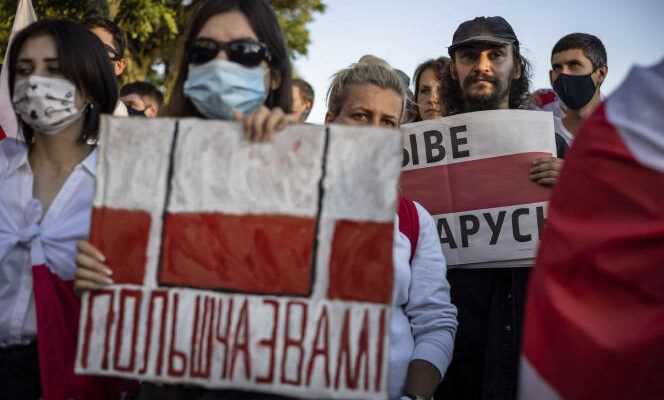This is another aspect of the repression carried out by the regime of Alexander Lukashenko against the protest movement in Belarus. That of the systematic destruction of organizations that defend Belarusian culture and language. In recent months, these structures – opposed to the president, a nostalgic for the Soviet Union who has continued to marginalize the second official language of the country since he came to power in 1994 – are liquidated one after the other. Among the main ones are the Belarusian Language Society, created in 1921 and which had survived the wave of Russification of the country during the Soviet period, the Belarusian Writers’ Union, founded in the 1930s, and Talaka, which defended the folk symbols and rituals of this Belarus built on European influences.
The repression also extends to people speaking Belarusian in public spaces, among whom the arrests are increasing. Latest episode, on September 27, Andrei Kolas, teacher of Belarusian history at the small language school of Volkovysk, in the west of the country, was sentenced to ten days in prison on the pretext of a video “Extremist” published in 2018 on social networks. The man was one of the last teachers at the institution to choose to stay in the country. For the co-founder of the language school Mova Nanova, which managed several branches like those in Volkovysk across the country, the closure of its structure this summer, and that of other organizations defending Belarusian culture, is due to the fact that they “Protect[nt] Belarusian identity and not Russian identity. Unfortunately, many among the authorities defend another vision. It can be seen all the more today ”.
“The language becomes politicized”
According to Alex Kokcharov, political risk analyst in Eastern countries, the crackdown on the Belarusian language came after the wave of protests that rocked the country during the fraudulent re-election of Alexander Lukashenko in August 2020. These gatherings , in which the demonstrators sang in Belarusian, wore traditional shirts, the “vyshyvankas”, and made the old white, red, white flag the symbol of democratic Belarus, “Represented a threat” ideological for the regime, according to the researcher.
Since then, a discreet movement of interest in this language and this culture seems to emerge in the country, where the majority of Russian is spoken after a little more than two centuries of domination of the big neighbor, from the Russian Empire to the Union. Soviet. Belarusian is officially the second language, but in practice the administration and power only use Russian. The same goes for television and state media. Within the population, less than 8% use it on a daily basis, according to a survey published in December 2020 by the Center for East European and International Studies (ZOiS).
You have 42.42% of this article left to read. The rest is for subscribers only.
